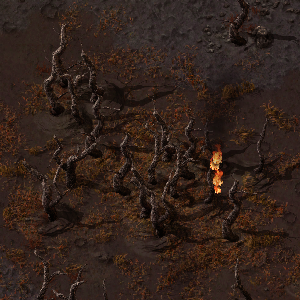Ashland tree: Difference between revisions
Jump to navigation
Jump to search
No edit summary |
Let's not invent lore (especially when it doesnt match the fff...) |
||
| (One intermediate revision by one other user not shown) | |||
| Line 2: | Line 2: | ||
{{:Infobox:Ashland tree}} | {{:Infobox:Ashland tree}} | ||
{{About/Space age}} | {{About/Space age}} | ||
'''Ashland trees''' are part of the natural [[map generator|terrain generation]] in [[Vulcanus]]{{SA}}, acting as a source of [[carbon]]. | '''Ashland trees''' are part of the natural [[map generator|terrain generation]] in [[Vulcanus]]{{SA}}, acting as a source of [[carbon]]. There are also flaming ashland trees, which leave a small radius of fire on the ground when chopped down. | ||
Despite already being adapted to fire, setting either variant of tree on fire with a weapon such as a [[flamethrower]] can still burn the trees away, reducing them to stumps just like standard trees. | |||
== History == | == History == | ||
| Line 8: | Line 10: | ||
* Introduced in [[Space Age]]{{SA}} expansion. | * Introduced in [[Space Age]]{{SA}} expansion. | ||
}} | }} | ||
{{EnvironmentNav}} | {{EnvironmentNav}} | ||
Latest revision as of 16:51, 4 February 2025
| Ashland tree |
|
Can be chopped down for carbon. |
|
|
Map color |
|
|
Expected resources |
|
|
Health |
Ashland tree: 50 |
|
Mining time |
0.5 |
Object description
![]() Space Age expansion exclusive feature.
Space Age expansion exclusive feature.
Ashland trees are part of the natural terrain generation in Vulcanus![]() , acting as a source of carbon. There are also flaming ashland trees, which leave a small radius of fire on the ground when chopped down.
, acting as a source of carbon. There are also flaming ashland trees, which leave a small radius of fire on the ground when chopped down.
Despite already being adapted to fire, setting either variant of tree on fire with a weapon such as a flamethrower can still burn the trees away, reducing them to stumps just like standard trees.
